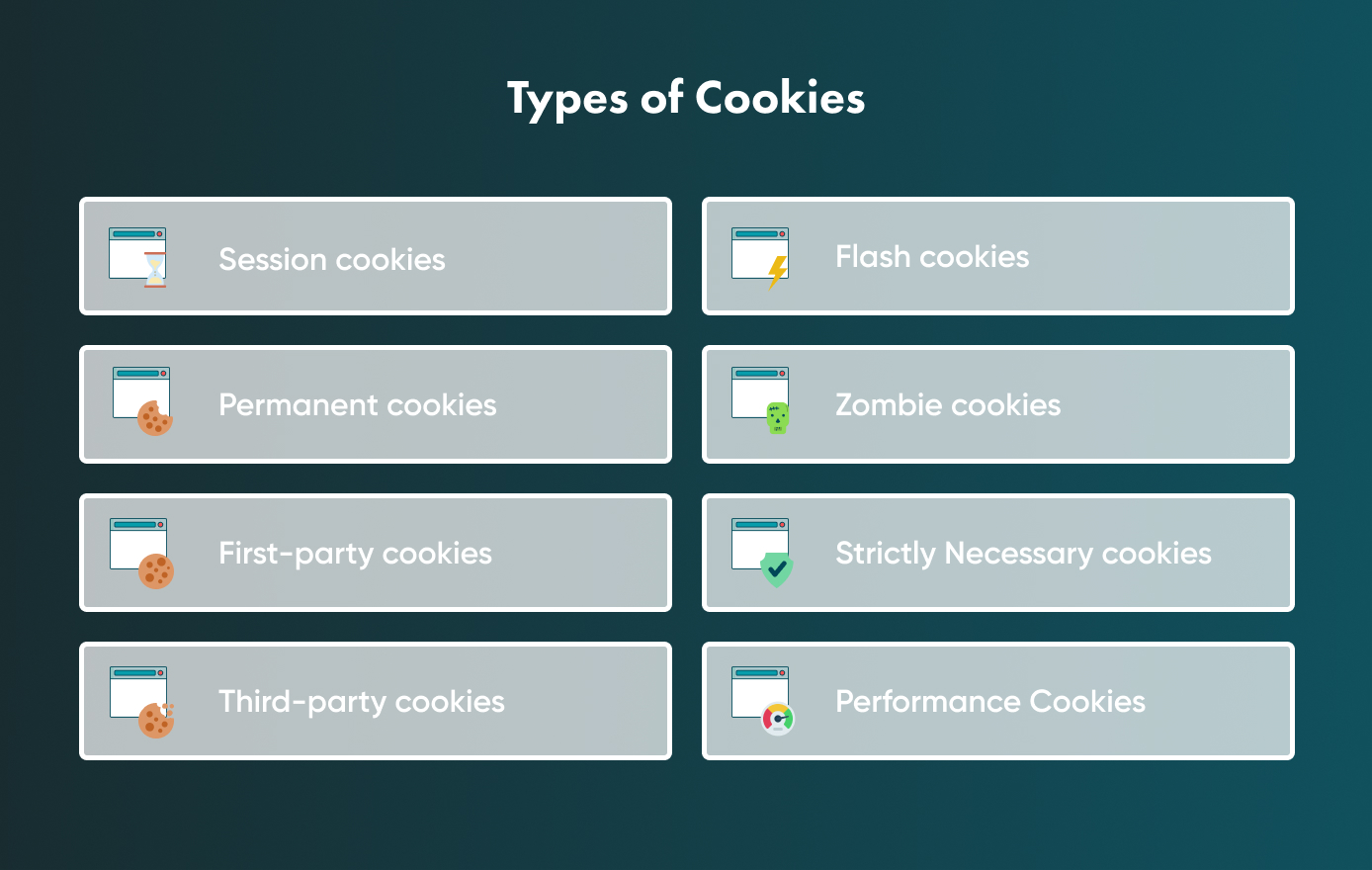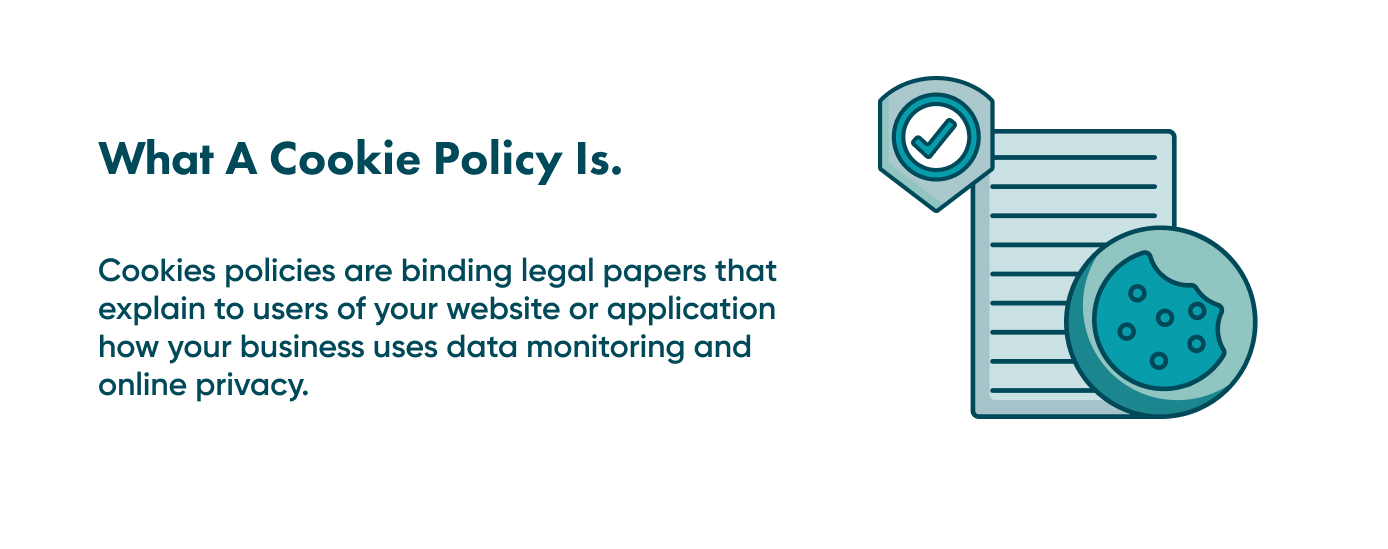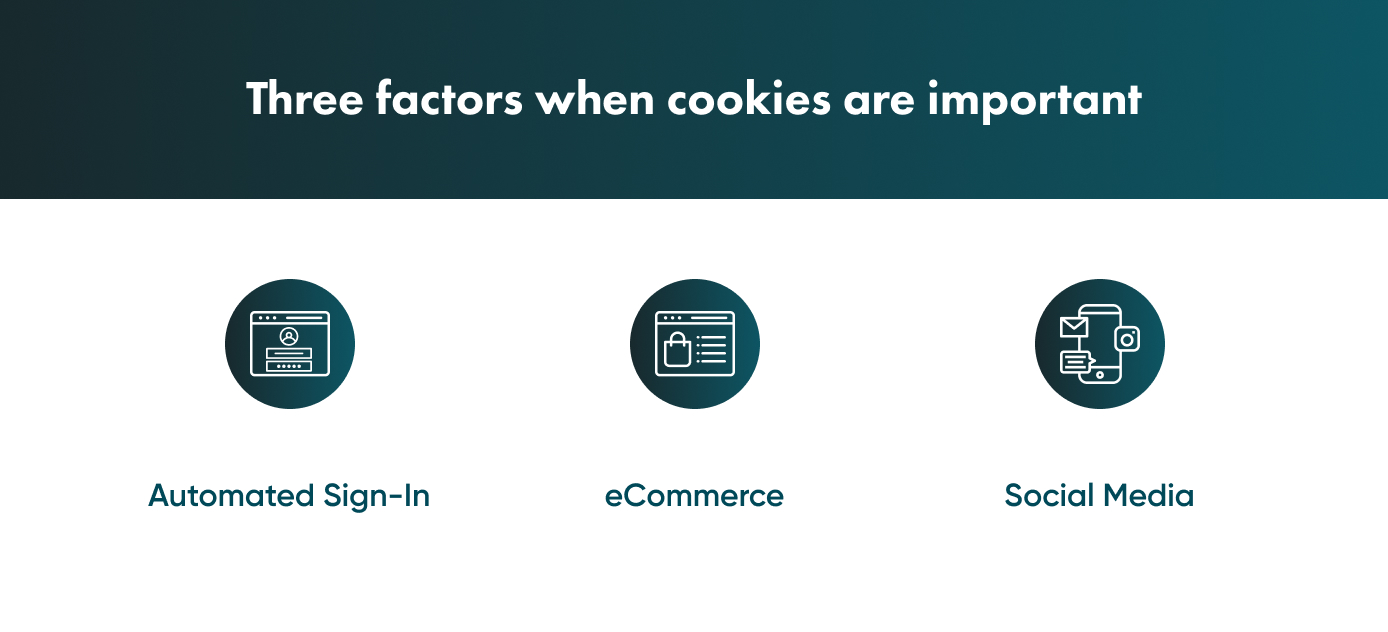What Are Website Cookie Policies and Why You Need To Apply Them


Providing a fast yet secure Web service can be a challenge. Here is a valuable insight into the cookies that help do just that.
The trust of users towards your website is built on transparency. Therefore, users need to know how your website processes, stores, and uses information. Depending on it, users will understand whether their personal data is safe and how the website they visit cares about their sensitive information.
This article aims to explain the importance of cookie policy on your website, the definition of cookies, how it refers to the privacy policy, what types of cookies exist, and why you cannot ignore the cookie policy if you want to retain customers and avoid fines.
What are Cookies?

Cookies are small text files that a web server stores on computers using a browser. Any information about a website visitor can be recorded in these files: what time and from what device a person visited the page, what services or products he or she was interested in, etc.
Every website has its own set of unique visible cookie files. Websites have access to the cookies of users who visit these websites. However, for example, eCommerce websites cannot access the files of users of streaming platforms.
It is prohibited to record the personal data of users to cookies.
Nevertheless, cookies can still contain valuable information that cyber attackers can steal and sell illegally, violating your data privacy.
When you visit any website, you can find out whether it gathers information about you. You need to open the “Confidentiality” section in your settings.
Make your website secure with Go Wombat — contact us!
How Cookies Work
You need to understand the use of cookies and how they work.
Browsers and servers are exchanging data using HTTP protocol during a session. A piece of information will be stored only during one session. When the tab is closed, this information is deleted as unnecessary.
However, some files are stored for a long time, and a particular cookies.txt file is created in the browser’s directory by default. Of course, users can delete these cookies. The information from this file is used during the following sessions on websites. When a new session starts, a browser uploads all credentials on its own or applies other settings. It reduces the load on the server, and users are satisfied with a high performance of a website.
Types of Cookies

Well, now you know how cookies work. Then, let’s examine the types of existing cookies and their details.
Session Cookies
Sessions cookies, or temporary cookies, process the information only when users are active on the website. Websites use cookies to recognise users and provided information when users surf their websites. So when the browser is closed, session cookies are deleted.
Permanent Cookies
Permanent or persistent cookies keep working even when the web browser has closed. This is because permanent cookies remain on the user’s device for a long time. However, some websites have time limits: if users don’t visit a website for a specific period, they will need to enter their data again next time.
First-party Cookies
First-party cookies are created and used by the website that users visit. Using first-party cookies, websites can gather analytical data, remember language settings, and enable other helpful features contributing to a better user experience.
Third-party Cookies
Third-party cookies are created and installed not by a website users visit but by third parties which collect specific information about users to identify their behaviour or spending habits. For example, advertisers can be a third party and use such cookies to target their products and services to the right audience.
Flash Cookies
Flash cookies or super cookies are files recorded by a top-level domain system. For example, users visit the website text.example.com, but cookies are recorded by example.com, i.e., by a top-level domain. Such cookies are insecure and can be stolen by cyber attackers. So search engines usually block resources with such cookies.
Zombie Cookies
This is the type of ‘flash cookies’ are recreated after the deletion. Even if users deleted all cookies from the browser’s history, these cookies could be restored and used by third-party systems. Search engines also block resources that strive to record the information insecurely.
Strictly Necessary Cookies
These cookies are essential to provide you with the requested services, which means they cannot be switched off through the consent banner. For example, cookies that save your cookies preferences.
Performance Cookies
Cookies are used to evaluate how often our website is visited and how the website is utilised. We use this information to give you a better user experience and improve our services according to your demands. We use third-party cookies for these evaluations.
Here, at the Go Wombat website, we use the latter ones — Strictly Necessary and Performance cookies.
What Is A Cookie Policy?

The cookie policy is the document that describes to users everything your online resource does with cookies. A website cookie policy is not mandatorily required by the GDPR or any other data protection laws, but most websites create it. It is one way to show that websites work transparently and users can trust them.
This transparency principle helps websites communicate with users and report their ways of data processing. Website owners explain how they use cookies on their sites. Also, in addition to informing users, cookie policies notify users when any tracking technology is used.
However, the cookie policy is frequently confused with the privacy policy. Yes, they work together, but they are not the same. The following section will explain the difference between them.
The Difference Between A Privacy Policy And A Cookie Policy
As we’ve already discovered, a cookie policy is a legal document that includes information about cookies used on the website. If it is available on a website, it must comply with the GDPR, CCPA, and other relevant laws, depending on the region.
Simply put, a cookie policy explains the purposes of used cookies, shows third parties which may install cookies or have already done so, and should also provide the link to the cookie policy of mentioned third parties.
The privacy policy is another legal document providing information about the company and how it works with users’ personal data. Laws like GDPR or CCPA do the same — describe the regulations for processing users’ personal information.
Based on those mentioned above, a privacy policy is a more general document that provides information on how to work with users' personal data and manage cookies.
The cookie policy can be part of the privacy policy, so if the privacy policy already includes a cookie policy, you may not have to create an individual cookie policy.
What is the right way to embed a privacy policy on your website? Contact Go Wombat, and we will provide a detailed consultation!
Why Do You Need A Cookie Policy Or Cookies At All?
As we mentioned, cookie files are created to make web surfing faster and more convenient. Because of cookies, the user doesn’t need to enter credentials every time they visit a website and update settings on websites he or she visits more often. As a result, a web server's load is minimised, making online services faster. If you don’t use cookies, many modern websites lose much of their functionality.

Let’s consider situations where cookies are a must-have:
Automated Sign-In
Today, almost all websites open more opportunities for users after authorisation. Users would have to enter credentials again after each visit if it weren't for cookies. It takes more time and irritates users, especially with mobile devices. All necessary information is transferred when the session opens, so users can quickly sign in using their saved personal data.
Commercial Aspects
eCommerce websites would have been more difficult to use without cookies for the comparison and purchase of goods. The shopping cart holds all items users selected even if they left a website for a while.
Social Media
Most users today open social media accounts more often than emails. Cookies make it possible to save information about personal settings, regions, languages, and other parameters. Otherwise, users would have to configure and set up everything from the beginning.
When To Use Cookie Policy
If you still don’t know whether your website requires a cookie policy, we will provide a few reasons it must be available on your website.
Firstly, if your website is based in the European Union or your business stores, processes or gathers data from EU citizens, you need to comply with the GDPR.
GDPR stands for General Data Protection Regulation, and we have already covered this topic. You can find out more about the comparison of GDPR and HIPAA, as well as check out the article about the impact of GDPR on small- and medium-sized businesses.
So, you need to obtain consent from your visitors to collect their personal data under the GDPR, and it can be implemented only if you notify them about the use of cookies on your website.
The same applies to the CCPA regulations (California Consumer Privacy Act). This act states that California-based residents must have the right to access a cookie policy and opt out of cookies as well.
Personal data protection and data privacy play the most crucial role, so your business must comply with all local regulations to protect your business and avoid cybersecurity risks. We will cover the use of cookies policy for GDPR and CCPA below, revealing more details.
GDPR Compliance
The GDPR obligates website owners to provide a cookie policy if they work with the personal information of EU citizens. All visitors from the EU must be notified that your website uses cookies to track and gather their data.
Another critical requirement of the GDPR cookie policy is the mandatory use of a cookie banner. Cookie banners pop up on the screen once users enter a website, and these banners must contain specific elements to ensure compliance.
Cookie banners compliance requirements include the following.
- Link to your cookies policy
- Option to opt in or opt-out
- Acting in good faith to opt customers out
- How you deploy cookies
- How you handle third-party data sharing
Banners must be visible to anyone and contain clear messages.
CCPA Compliance
The CCPA protects website and app users from companies which store cookies on their devices without consent. All users under the GDPR have legal rights when it comes to the processing or keeping of their personal information.
There are the following consumer rights under the CCPA:
- Right to opt-out
- Right to be informed
- Right to disclosure
- Right to deletion
- Right to equal services and prices
These regulations are among the most frequently applied.
Still, all regions have local laws you must follow and build the protection of personal data according to them.
Unlock Success with Premium Software Development
Contact us


Let’s Make It Together!
It is vital for you to understand the importance of compliance with local regulations since your business and trustful relationships with customers depend on your attitude to their security.
At Go Wombat, we are experts in making your website or app compliant with GDPR since our certified Chief Information Security Officer has vast experience creating apps that meet the GDPR requirements.
In addition, the cookie policy is a direct requirement of GDPR. So cookie policy is the service we can provide as a part of our security services.
Remember, if you are compliant with local regulations — it already takes your business to a higher level. It demonstrates your serious approach.
Go Wombat’s specialists have all the skills to make it real, and we are always ready!
Start the development of your software projects with Go Wombat contact us!
How can we help you ?






